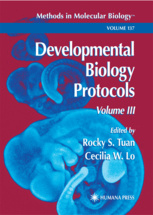Description
Developmental Biology Protocols, Softcover reprint of hardcover 1st ed. 2000
Volume III
Methods in Molecular Biology Series, Vol. 137
Coordinators: Tuan Rocky S., Lo Cecilia W.
Language: English
Subject for Developmental Biology Protocols:
Developmental Biology Protocols
Publication date: 11-2010
522 p. · 17.8x25.4 cm · Paperback
Publication date: 11-2010
522 p. · 17.8x25.4 cm · Paperback
Developmental biology protocols volume iii
Publication date: 01-2000
522 p. · 17.8x25.4 cm · Hardback
Publication date: 01-2000
522 p. · 17.8x25.4 cm · Hardback
Developmental biology protocols vol. 3 (methods in molecular biology 137)
Publication date: 01-2000
522 p. · 17x24.4 cm · Hardback
Publication date: 01-2000
522 p. · 17x24.4 cm · Hardback
Description
/li>Contents
/li>Comment
/li>
Developmental biology is one of the most exciting and fast-growing fields today. In part, this is so because the subject matter deals with the innately fascinating biological events?changes in form, structure, and function of the organism. The other reason for much of the excitement in developmental biology is that the field has truly become the unifying melting pot of biology, and provides a framework that integrates anatomy, physiology, genetics, biochemistry, and cellular and molecular biology, as well as evolutionary biology. No longer is the study of embryonic development merely ?embryology.? In fact, development biology has produced important paradigms for both basic and clinical biomedical sciences. Though modern developmental biology has its roots in ?experimental embry- ogy? and the even more classical ?chemical embryology,? the recent explosive and remarkable advances in developmental biology are critically linked to the advent of the ?cellular and molecular biology revolution.? The impressive arsenal of expe- mental and analytical tools derived from cell and molecular biology, which promise to continue to expand, together with the exponentially developing sophistication in fu- tional imaging and information technologies, guarantee that the study of the devel- ing embryo will contribute one of the most captivating areas of biological research in the next millennium.
Developmental Biology Protocols.- Manipulation Of Developmental Gene Expression and Function.- Ectopic Expression in Drosophila.- Clonal Analysis in the Examination of Gene Function in Drosophila.- Application of Antisense Oligodeoxynucleotides in Developing Chick Embryos.- Application of Functional Blocking Antibodies.- Analysis of Gene Expression.- Gene Expression Analyzed by Ribonuclease Protection Assay.- Relative Reverse Transcription-Polymerase Chain Reaction.- Gene Expression Analysis Using Quantitative Reverse Transcription-Polymerase Chain Reaction and a Multispecific Internal Control.- In Situ PCR Detection of HIV Expression in the Human Placenta.- Gene Expression Analysis by In Situ Hybridization.- Radio-Isotopic In Situ Hybridization on Tissue Sections.- mRNA and Protein Co-Localization on Tissue Sections by Sequential, Colorimetric In Situ Hybridization and Immunohistochemistry.- Whole Mount In Situ Hybridization to Study Gene Expression During Mouse Development.- Multicolor Whole-Mount In Situ Hybridization.- Methods for Double Detection of Gene Expression.- Visualization of the Expression of Green Fluorescent Protein (GFP)-Linked Proteins.- Monoclonal Antibodies in the Analysis of Embryonic Development.- Models of Morphogenesis and Development.- Mesoderm Induction in Xenopus.- Amphibian Organizer Activity.- Improved Techniques for Avian Embryo Culture, Somite Cell Culture, and Microsurgery.- Neural Crest Cell Outgrowth Cultures and the Analysis of Cell Migration.- The Chimeric Human/Mouse Model of Angiogenesis.- Analysis of Embryonic Vascular Morphogenesis.- Epithelial-Mesenchymal Interactions.- Methods for Manipulating the Chick Limb Bud to Study Gene Expression, Tissue Interactions, and Patterning.- Palate Development.- In Vitro Models and Analysis of Differentiation and Development.- In Vitro Fertilization.- Trophoblast Differentiation.- Bone Marrow-Derived Mesenchymal Progenitor Cells.- Identification, Characterization, and Differentiation of Human Prostate Cells.- Preparation of Chick Striated Muscle Cultures.- Study of Skeletal Myogenesis in Cultures of Unsegmented Paraxial Mesoderm.- Embryonic Limb Mesenchyme Micromass Culture as an In Vitro Model for Chondrogenesis and Cartilage Maturation.- Electroporation-Mediated DNA Transfection of Embryonic Chick Limb Mesenchymal Cells.- Murine C3H10T1/2 Multipotential Cells as an In Vitro Model of Mesenchymal Chondrogenesis.- Skeletogenesis.- Studying Early Hematopoiesis Using Avian Blastoderm Cultures.- Isolation and Culture of Mouse Germ Cells.- Cadherin-Mediated Cell-Cell Interactions.- Analysis of Hyaluronan Using Biotinylated Hyaluronan-Binding Proteins.- Microinjection of Fluorescently Labeled ?-Actinin into Living Cells.- Developmental Models Of Diseases.- Pax3 and Vertebrate Development.- Genetic-Engineered Models of Skeletal Diseases I.- Genetic-Engineered Models of Skeletal Diseases II.- Transgenic Mouse Models of Craniofacial Disorders.
Includes supplementary material: sn.pub/extras
© 2024 LAVOISIER S.A.S.




